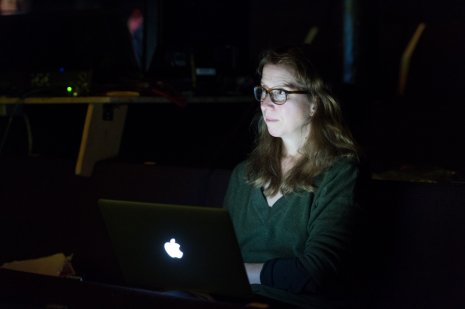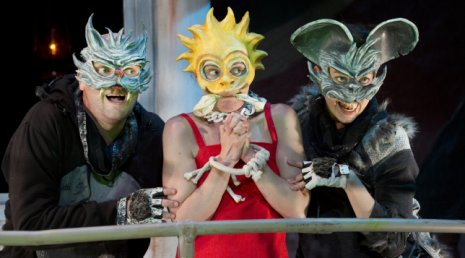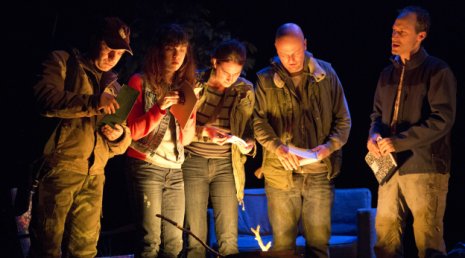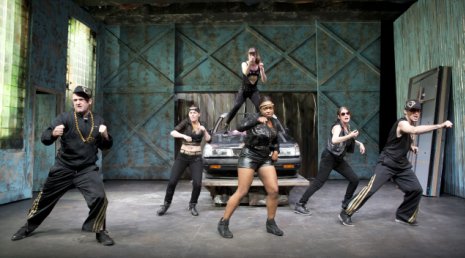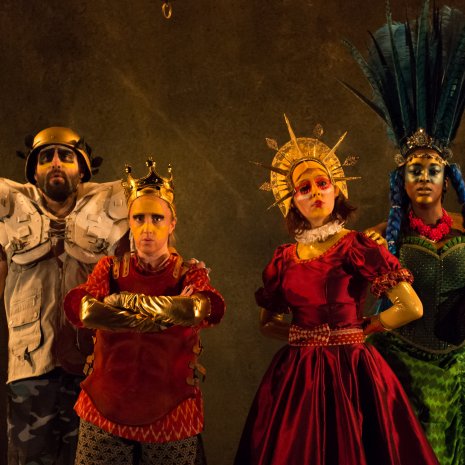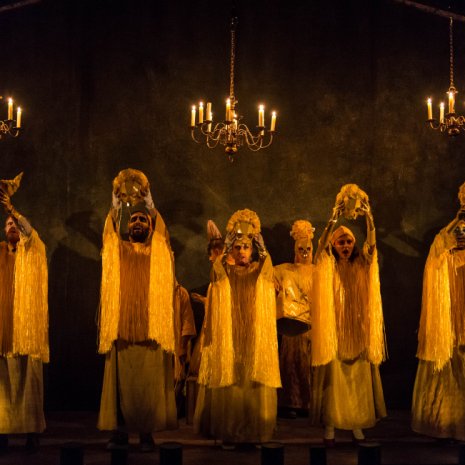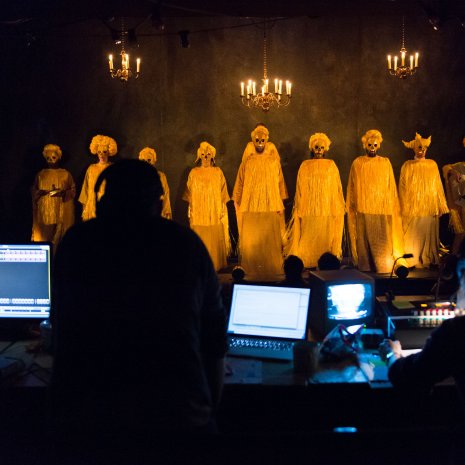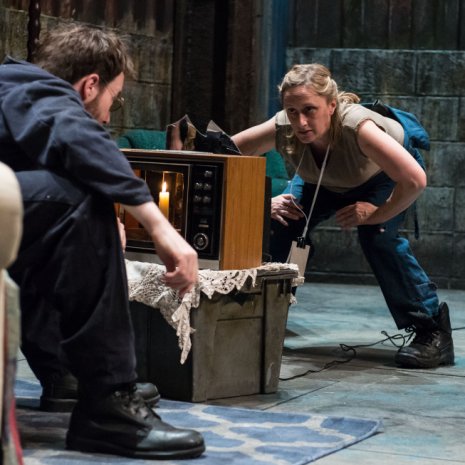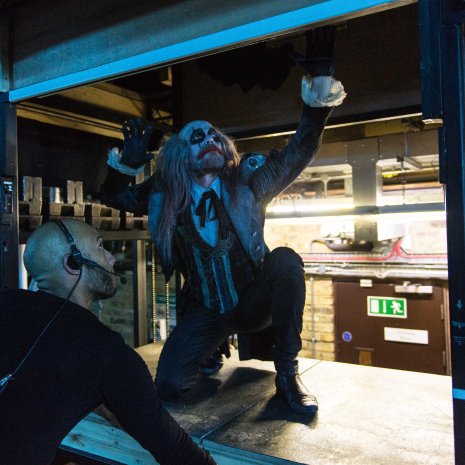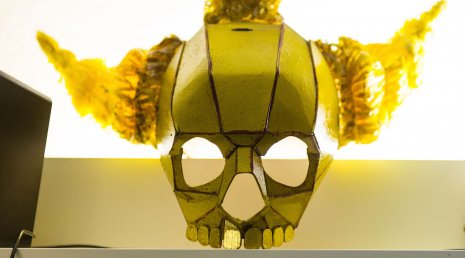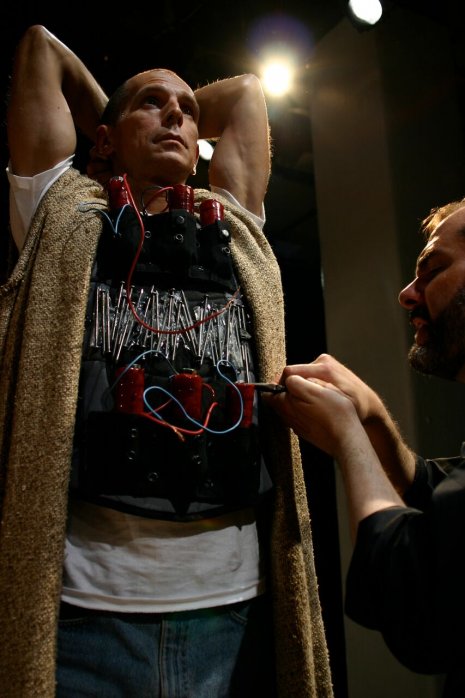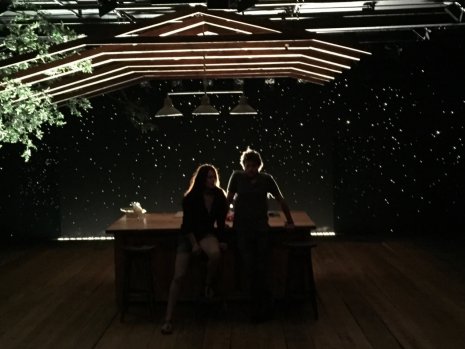Chapter One
Here, the email exchanges between Anne Washburn and Maria Goyanes,* associate producer, The Public Theater NYC; March - April 2016.
Maria Goyanes:
Where does a play or project begin for you? Is it an idea, a conversation, a contradiction, a feeling? Can you trace back for us the spark for your work? Take us back to those moments of conception, and what you were mining for?
Anne Washburn:
It can be any or all of those. Sometimes a play starts with a snatch of language or dialogue overheard in the real world, or in my head. I’ll jot it down and it will ultimately bloom into a play. The Internationalist began when I was, in my sort of hilarious capacity as part time document manager for a Swiss firm, sent to Zurich on a business trip. At a team luncheon, after drinking a lot of wine, one of my colleagues told a wonderful story in English, and another told a story in Swiss German, a language I cannot understand -- although he occasionally attempted to clarify the narrative for me. When I got back to my hotel room I wrote down the story I could understand, and the story I couldn’t understand – which at the time I expressed in dots and dashes (later I developed a made up language to fill in those gaps) and that was how I knew I had a play.
A play can begin with a question. Mr. Burns began with wondering what a pop culture narrative would look like if you pushed it past the apocalypse. I have a play called I Have Loved Strangers in which I brought together the Book of Jeremiah with the history of the Weather Underground because it seemed like a collision with juice in it and I wondered how to work with the language of the King James Bible alongside of contemporary language. I've done a few silent playwriting retreats where you begin with nothing, only the imperative to begin, and in those cases a random poem has started the process in each case in a different way. 10 out of 12, a play about a technical rehearsal, began with years of glancing observations about a process going around me which felt too large for me to understand fully and which I finally brought together into a narrative. I feel like plays are for writing what you don’t know, what puzzles you. I write where I am curious.
The Small came from looking at Theodore Roethke’s poem “The Small” and there I think a sense of scale of attention was suggested and maybe atmosphere, something tender. Antlia Pneumatica began by looking at a poem which somehow suggested to me – and I haven’t been able to find the poem in my notes and I no longer know if this was content or something I inferred – that I would be working with a character who was dead.
A poem can be a helpful start because it’s almost always partial and poems are themselves made more of charged association than tightly linked narration so you can pull at whatever is most potent to you and whisk it away – and while you can’t make a play of a poem – the language is too compressed to live for long in real time – the valance of theatrical language draws more from poetry than it does from the dialogic form in fiction.
Apparition was very much influenced by reading C.D. Wright’s book length poem, “Deep Step Come Shining,” in which the bits and pieces of a much larger narrative slowly accrue although always in a partial and slippery fashion; I was interested in working with that structure.
I usually think I know what a play is more or less about when I finish it and usually eventually discover that it probably has another set of concerns. Every play is very personal though it’s hard to put a finger on just how, exactly. I’ll start thinking I know which characters I most identify with and by the end of the rehearsal/production process find that has shifted.
MG:
Many questions for you: What’s so curious to me is how much you push the form in each of your plays. Your plays always strike me as so inventive stylistically but, more than that, they feel so intentional, and particularly in the way you utilize language. What is it about the way people communicate that you are most interested in? What does it reveal to you?
AW:
I’m interested in the difference between our literary conception of how people speak – i.e. coherently, and with intention -- and how they actually do speak; language-in-the-wild is so wide ranging and inventive, so partial and so playful and such a mash up of inference and specific detail. I’m interested in how much we use language all but nonsensically, just to entertain each other, or, how the act of entertaining each other and engaging each other is such an important part of keeping society organized and focused. We use language, hugely, the way a magician uses his hands, to obfuscate, to distract from a maneuver we hope will never be detected. Often we set up language as a placeholder for our existence, a continual beacon into which meaning as such only occasionally flickers. It’s all interesting.
MG:
You have oft been labeled an “experimental” writer? Do you consider yourself one?
AW:
I don't think I do, really. I don't feel like I'm forging new paths, though I do feel like I’m poking around sometimes in unused or underutilized areas of what passes for current playmaking conventions.
MG:
More questions: From what lineage did you spring? What works of art have inspired you the most? What writing do you always gravitate towards? What mentors are you indebted to?
AW:
I often feel like I'm the bastard child of the most old fashioned theater ever and maybe the weirdest. I love, just the fact of people on stage in costumes, like children, pretending to be other people -- I love all the things high art finds embarrassing about theater: the lurid story making, the grandstanding, and even just the super earnest desire to be looked at, to be seen, to please, which is part of the awkward heart of playmaking. But I also really love the possibility the stage has to capture the most tangential parts of our sensory and emotional world, and to expose the strangeness of being alive, the perishability of the bargain we’ve made with the world to stay sane.
Seeing the first show by a Seattle group, Run/Remain was huge for me; they were, in retrospect, hugely influenced by the Wooster Group who I hadn’t seen at the time (though they were also, in retrospect, bringing a true and original NW spirit to the work as well). Run/Remain’s first show was an adaptation of Tristan Tzara’s Gas Heart, a discombobulating production of a discombobulated text, and I deeply remember a moment when an actress slid under a bed, babbling, and brought a microphone with her, so that you saw the bed and a shadow underneath the bed and this continual secretive hysterical giggling and whispering unnaturally amplified. I had never seen anything like that and I thought it was so strange, and compelling, and important because although it was unintelligible it was also, in some intuitive way, true. I felt that it had captured some tiny corner of my experience that I didn’t have a way to encapsulate in language, something about charged half-glimpsed perceptions and free-floating emotion. It was a kind of poetry, although not technically ‘poetic.’ I feel like poetry is meant to evoke the parts of our experience we can’t quite put our finger on and there’s been such a fad for dramaturgical intelligibility in the last I-don’t-know how many decades of theater that we’ve a bit lost the ability theater has to evoke larger stranger ways of knowing the world.
My idea of how to make theater was changed twice, and radically, by David Greenspan. First, when I saw a production of Samuel 2/11 Acts/Jack in San Francisco and realized that theater could be fascinating on any topic, no matter how intimate, or quotidian. Then I saw his Myopia a number of times – it was more than 3 hours long I think when I first saw it -- where he created vast worlds and tiny worlds and interwove them and collided them just through the charisma of one speaking person on a bare stage. David Greenspan always stuns me; his plays are always both super intimate and enormous, anything is possible in them. He's a big Art Hero of mine.
I was also inspired by performances by the Wooster Group, by Big Dance Theater, and by groups inspired by them or who sprang from the same well, some Elevator Repair Service, some Richard Foreman… Mac Wellman was someone whose work I struggled with for a while; I saw a few infelicitous productions where I thought the play was senselessly over linguistic and then I saw a number of very small productions that felt a bit like miracles where the language became a evocative structure for a stranger and very inventive experience.
I’m very indebted to Maria Irene Fornes – by her plays and also by her teaching which I partook of a few times, and by her scrupulous example: she always made any play she wanted to make. Gordon Dahlquist had plays up in Portland when I was a student there and the extremity of them and the adventure of them permanently formed my notion of how far one could take narrative -- I realized that you could make narratives that ranged wildly in time and space, that you could set them in impossible places or futures and they could still be emotionally intimate. John Guare was important for me, the plasticity of his concerns, how he manages to work with both a high level of seriousness and a dark humor. A bad student production of Lydie Breeze was huge for me; a play set in a post civil war America which was both a penetrating look at the 1960s and how ideals form us and deform us and betray us, and at the same time filled with juicy theatrical pleasures…an actor who plays Frankenstein’s monster, lurid secrets, music.
I’m super moved by medieval paintings, by the Abstract Expressionists, by work that is not meant to be literal, where you feel another reality pulsing out from behind a visual representation. I don’t generally find that prose is a direct inspiration, except as content or, images and thoughts that I’m sure have percolated up.
I’ve also been inspired and influenced by a ton of my peers. I feel like I came up at a very exciting time in American playwriting with so many people pushing and pulling at the possibilities with precision and heart. I think in part this had to do with how impossible it was to have a play up, at that time. The major theaters were making one kind of play, and this new batch of writers were making a rather different kind of play and the two groups were at loggerheads for a while. Now the whole ethos has shifted a bit and a lot of the major New York theaters have small studio or secondary stages where they can take a risk on a new writer but they didn’t at the time. So we were sort of left to our own devices, a lot of new writers and directors, a lot of them as much influenced by performance as by traditional plays, and so in an odd way, because no one was paying us any mind, we had a lot of freedom to mess around and try things out. It’s very helpful to be unimportant.


